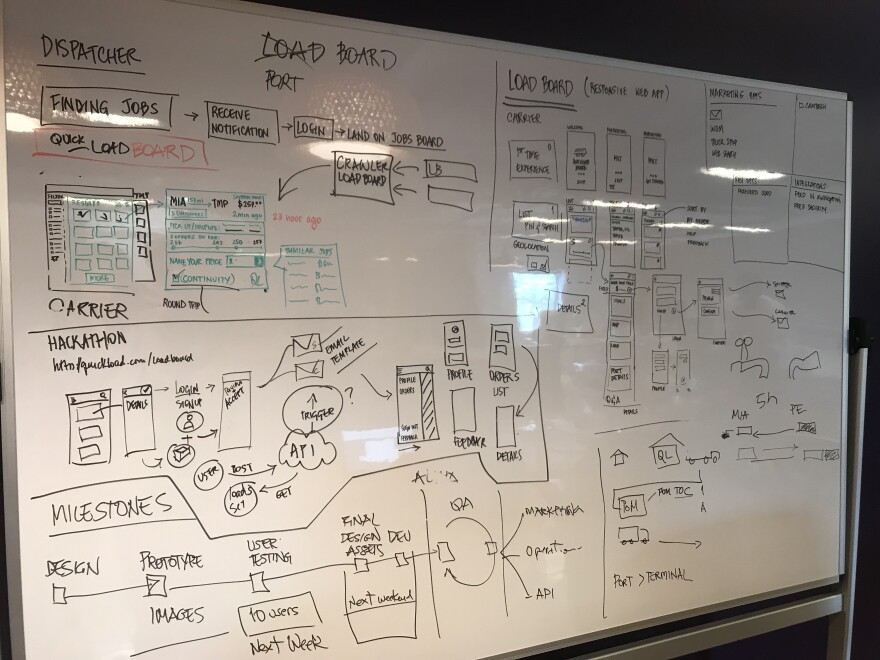Adrien Stephen has his dream job. He got it when he moved from Haiti to Miami 25 years ago -- but even before that, he knew what he wanted to do.
"When I go on the road, I see those guys in the big trucks. I always wanted to be a driver."
Stephen drives for a company called BOS Global Logistics, and although he loves being on the road and exploring Florida, his job has quite a few challenges. He works long hours and sometimes it takes a while to get paid.
And, oh yeah, the traffic. ("Three o’clock, everywhere, anywhere you go," Stephen says. "95, 836, oh my God, 112!").
A Miami startup is trying to make the jobs of truck drivers like Stephen more efficient. The company, QuickLoad, has developed an app that connects the companies that make stuff to the people who move stuff.
CEO Ozan Baran -- who also owns the company Adrien Stephen drives for -- compares the QuickLoad app to Uber.
"Uber is moving people; we are moving cargo," he says.
The main challenge the app aims to address is "less-than-full-load" trips. That's when a truck is on the road but not filled to capacity -- or worse, empty. For drivers and trucking companies, less-than-full loads waste time and fuel. QuickLoad says 30 percent of all miles driven by truckers are less-than-full loads.

"You leave your house from Miami and you go to California, and let's say you're making $4,000 or $5,000 to go to California [with a load]" Baran says. "Then you're in California and somebody says, 'Listen, I have a load for you if you go back to your home.'"
Using the app, "Instead of going back empty, you could go for maybe $3,000, $4,000," he says. "This is where you can make money."
Similar to Uber, shippers enter the location and details for their loads, and truckers and trucking companies vetted by QuickLoad select the loads that make sense for them. QuickLoad takes a cut of what the shippers pay.
The app also digitizes some of the paperwork truckers and shippers need to fill out and automates the payment process so drivers get paid in about 48 hours. Baran and others in the trucking industry say normally it can take 15 to 30 days for drivers to get paid because it typically takes multiple transactions for money to make its way from shipper to driver.
But QuickLoad and other companies like it have skeptics, who say they don't expect the apps will disrupt the logistics industry in the same Uber disrupted the taxi industry.
QuickLoad will "have a very big uphill battle," says Andy Berke, the vice president for strategic ventures with BlueGrace Logistics, a company that helps other companies improve how they transport freight. (There's some overlap between BlueGrace and QuickLoad, but the two are not direct competitors.) "Unless they're extremely well-funded, it's going to be a pretty challenging road for them."
Berke says there are more than 20 other companies doing what QuickLoad’s doing -- what he calls “Uberizing” trucking -- and says drivers and shippers may prefer large startups with national name recognition to small startups with less cachet. QuickLoad competitors include Uber itself and Convoy -- a company with investors like Amazon CEO Jeff Bezos and Microsoft founder Bill Gates.
"For a truck driver, it’s like, OK, where does he want to make his money? Who’s going to feed him? It’s not going to be one of the little guys," Berke says.
Burke says the app companies might also be challenged by who's available to hire. A new federally mandated electronic logging system has made it harder for truckers to work illegally long hours -- leading, in turn, to a shortage of available trucks for many types of loads. Berke says there's so much demand for truck drivers right now that it shouldn't be hard for freelance drivers and companies to find work.
If a freelance trucker or trucking company has empty space, "they're already doing a bad job," Berke said. "They're not an efficient player in the market."

But companies like QuickLoad and Convoy say trucking wasn’t that efficient to begin with. They point out that some companies still rely on multiple back-and-forth phone calls, emails or even fax machines to confirm jobs. QuickLoad founder Ozan Baran also notes that the "Uberizing" companies aren't just about connecting shippers and drivers; they also speed up the payment process and streamline paperwork.
And QuickLoad has something else going for it: its network. Baran’s other company, BOS Global Logistics, is a pretty major player in trucking in South Florida. Shippers and truckers who trust that company have started using the QuickLoad app.
One of them, of course, is Adrien Stephen. He says the app has made his job easier -- it takes less work for him to find more loads. But it hasn’t changed much about his paycheck.
"Work more, you know," he says, "but no extra money."
And, he says, QuickLoad definitely hasn’t changed another big problem for truckers in South Florida: traffic.





